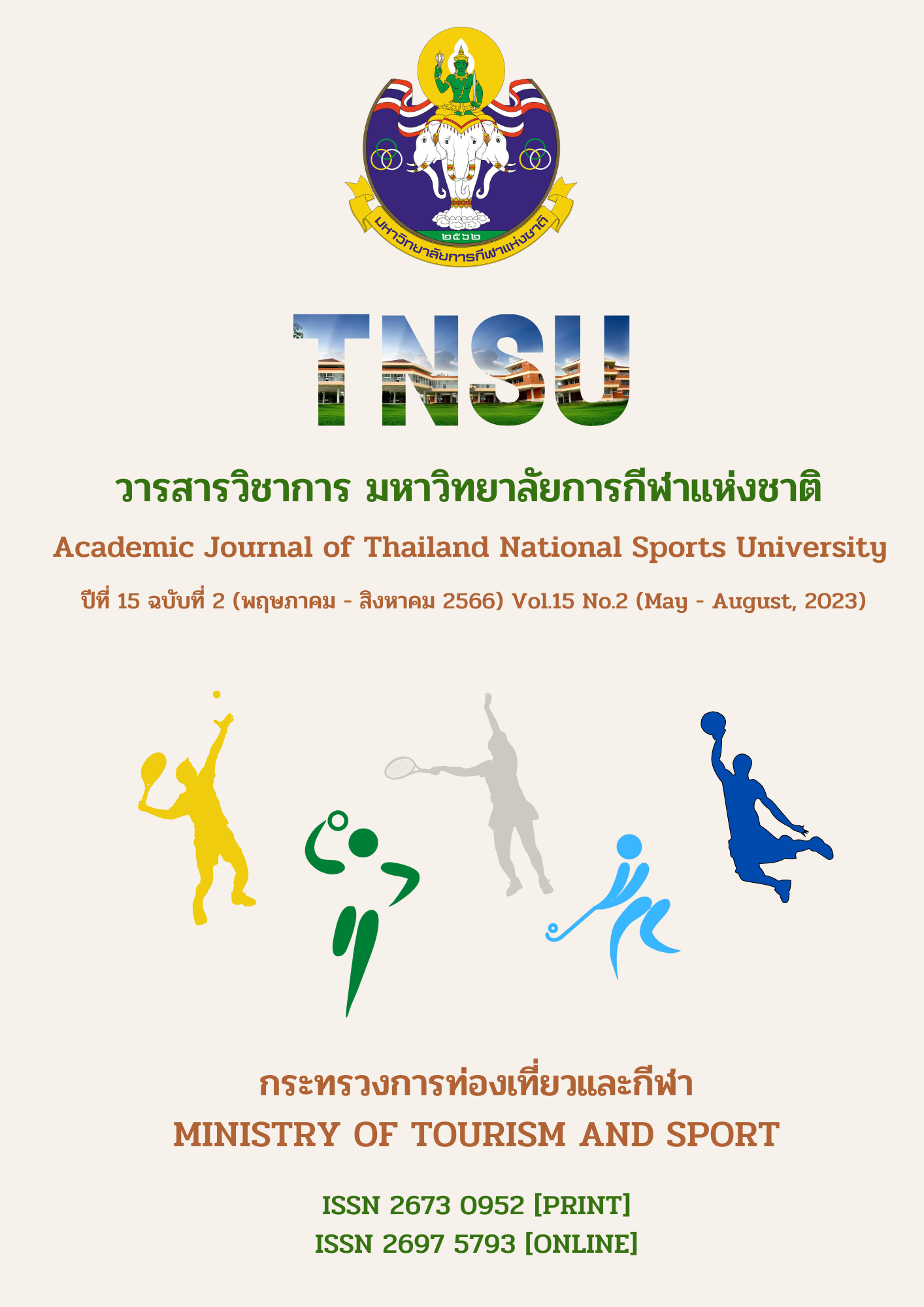ผลการจัดการเรียนรู้พลศึกษาตามแนวคิดการเรียนรู้เชิงรุกที่มีต่อผลสัมฤทธิ์ทางการเรียน เรื่องทักษะการเคลื่อนไหวพื้นฐานของนักเรียนประถมศึกษา
Main Article Content
บทคัดย่อ
การวิจัยครั้งนี้มีวัตถุประสงค์ เพื่อ1) เปรียบเทียบค่าเฉลี่ยคะแนนผลสัมฤทธิ์ทางการเรียนเรื่องทักษะการเคลื่อนไหวพื้นฐานก่อนและหลังการทดลองของกลุ่มทดลองที่ได้รับการจัดการเรียนรู้พลศึกษาตามแนวคิดการเรียนรู้เชิงรุก 2) เปรียบเทียบค่าเฉลี่ยคะแนนผลสัมฤทธิ์ทางการเรียนเรื่องทักษะการเคลื่อนไหวพื้นฐานหลังการทดลองของกลุ่มทดลองกับกลุ่มควบคุม วิธีดำเนินการวิจัย กลุ่มตัวอย่างเป็นนักเรียนประถมศึกษาปีที่ 1 จำนวน 54 คน ได้จากการสุ่มอย่างง่าย แบ่งเป็นกลุ่มทดลองได้รับการจัดการเรียนรู้พลศึกษาตามแนวคิดการเรียนรู้เชิงรุก จำนวน 27 คน และกลุ่มควบคุมได้รับการจัดการเรียนรู้แบบปกติ จำนวน 27 คน เครื่องมือที่ใช้ในการวิจัย ได้แก่ การจัดการเรียนรู้พลศึกษาตามแนวคิดการเรียนรู้เชิงรุก จำนวน 8 แผน มีค่าดัชนีความสอดคล้องรวม 0.77 - 0.88 และแบบวัดผลสัมฤทธิ์ทางการเรียนด้านความรู้ ด้านเจตคติ และด้านทักษะการเคลื่อนไหวพื้นฐาน มีค่าดัชนีความสอดคล้อง 0.83, 0.97 และ 1.00 ตามลำดับ และแบบวัดผลสัมฤทธิ์ทางการเรียน ด้านความรู้มีค่าความเที่ยงเท่ากับ 0.784 ด้านเจตคติมีค่าความเที่ยงเท่ากับ 0.790 แบบทดสอบทักษะ การเคลื่อนไหวพื้นฐานมีค่าความเที่ยงเท่ากับ 0.573 ระยะเวลาในการดำเนินการวิจัย 8 สัปดาห์ วิเคราะห์ข้อมูลโดยใช้ค่าเฉลี่ย ส่วนเบี่ยงเบนมาตรฐาน และเปรียบเทียบผลการวิเคราะห์ข้อมูลด้วยค่าที (t - test) ผลการวิจัยพบว่า 1) ค่าเฉลี่ยคะแนนผลสัมฤทธิ์ทางการเรียนด้านความรู้ ด้านเจตคติ และด้านทักษะการเคลื่อนไหวพื้นฐานของกลุ่มทดลองหลังการทดลองสูงกว่าก่อนการทดลองอย่างมีนัยสำคัญทางสถิติที่ระดับ .05 2) ค่าเฉลี่ยคะแนนผลสัมฤทธิ์ทางการเรียนด้านเจตคติหลังการทดลองของกลุ่มทดลองสูงกว่ากลุ่มควบคุมอย่างมีนัยสำคัญทางสถิติที่ระดับ .05 และค่าเฉลี่ยคะแนนผลสัมฤทธิ์ทางการเรียนด้านความรู้และด้านทักษะการเคลื่อนไหวพื้นฐานหลังการทดลองไม่แตกต่างอย่างมีนัยสำคัญทางสถิติที่ระดับ .05
Article Details

อนุญาตภายใต้เงื่อนไข Creative Commons Attribution-NonCommercial-NoDerivatives 4.0 International License.
บทความที่ได้รับการตีพิมพ์เป็นลิขสิทธิ์ของวารสารวิชาการ มหาวิทยาลัยการกีฬาแห่งชาติ ข้อความที่ปรากฏในบทความแต่ละเรื่องในวารสารวิชาการเล่มนี้ เป็นความคิดเห็นส่วนตัวของผู้เขียนแต่ละท่านไม่เกี่ยวข้องกับวารสารวิชาการมหาวิทยาลัยการกีฬาแห่งชาติ แต่อย่างใด ความรับผิดชอบองค์ประกอบทั้งหมดของบทความแต่ละเรื่องเป็นของผู้เขียนแต่ละท่าน หากมีความผิดพลาดใดๆ ผู้เขียนแต่ละท่านจะรับผิดชอบบทความของตนเองแต่ผู้เดียว
เอกสารอ้างอิง
Bonwell, C. C., & Eison, J. A. (1991). Active learning: Creating excitement in the classroom. ASHE - ERIC higher education report No. 1.
Washington, D.C.: The George Washington University, School of Education and Human Development. Brain with happiness and knowledge. Bangkok: Kosit Printing.
Detdanai Juychum, Ketsara Bowchamchoy, & Sirikanya Kanthong. (2016). The enhancement of learning achievement of students on thinking skill of thinking skills module (11-024-112) employing the active learning method, 1st semester of academic year 2015, Princess of Naradhiwas University, Journal of Humanities and Social Sciences, 3(2), July - December.
Duncan, M. J., Bryant, E., Stodden, D. (2016). Low fundamental movement skill proficiency is associated with high BMI and body fatness in girls but not boys aged 6 – 11 years old. Journal Sports Sci, 35(21), 2135 - 2141.
Elna de Waal. (2019). Fundamental movement skills and academic performance of 5 - to 6 -year - old Preschoolers. Early Childhood Education Journal, 47, 455 – 464. https://doi.org/10.1007/s10643-019-00936-6
Hastie, P. A. (2006). Teaching elementary physical education: Strategies for the classroom teacher. U.S.A.: Pearson Benjamin Cumming is a trademark of Pearson Education.
Jirakitt Naowaphongrat. (2019). Effects of physical education learning management using active learning on learning achievement and problem solving abilities of eighth grade students. Education in Health and Physical Education Department of Curriculum and Instruction Faculty of Education Chulalongkorn University.
Jirakorn Siriprasert. (2000). Skills and Techniques for Teaching Physical Education at the Primary Level. Bangkok: Chulalongkorn University Press.
Killian, & Batas. (2015). The effects of an active learning strategy on students’ attitude and students’ performances in introductory sociology classes. Journal of the Scholarship of Teaching and Learning, 15, 53 – 67.
Kingkaew Arirak. (2005). Knowledge Management Using Various Forms. Bangkok: Methee Tips.
Korrawich Ketthanong, Thanomsak Senakham, & Mayuree Suphawibul. (2010). Comparison of strength training between on the floor and with exercise ball. Journal of Sports Science and Technology, 11(2), 32 – 47.
Lubans, D. R., Morgan, P. J., Cliff, D. P., Barnett, L. M., & Okely, A. D. (2010). Fundamental movement skills in children and adolescents: Review of associated health benefits. Sports Med, 40(12), 1019 – 1035.
Michael, J., Emma, L. J., & Samuel, W. (2017). The effects of 10 - week integrated neuromuscular training on fundamental movement skills and physical self - efficacy in 6 – 7 – year - old children. School of Life Sciences, Coventry University, Coventry, United Kingdom.
Ministry of Education. (1999) National education act B.E. 1999. Bangkok: Teachers Council of Thailand Printing House, Ladprao.
Ministry of Education. (2008a). National education act. Bangkok: Publishing House, Teachers Council of Ladprao.
Ministry of Education. (2008b). Basic education core curriculum 2008. Bangkok: Printing House.
Morable. (2000). Using Active Learning Techniques. Department of Education, the Texas Higher Education Coordinating Board and Richland College.
Nonthalee Pornthadawit. (2017). Active Learning. Bangkok: Triple Education.
Polpat Buakaew. (2017). The development of an assessment based on the actual condition of advanced movement skills. Basic for elementary school students. Educational Electronic Journal, 12(3), 35 – 50.
Sansanee Chatkup. (2001). Research report on Happy Learning: Brain Chemicals and Happiness and Knowledge. Bangkok Kosit Printing.
Soraya Sathongthien. (2019). Child nature. Retrieved from http://www.pt.mahidol.ac.th/ knowledge/?author=6
Sriwaisri Manee. (2013). Games and leading games. Bangkok: RTP Printing.
Thai Health Promotion Foundation (2020). Active Learning. Retrieved from http://mcmk.innoobec.com/?s=active+learning
Wichai Wongyai. (2001). Educational Curriculum Development (2nd ed.). Bangkok: Charansanitwong printing.
Worasak Pianchob. (1980). Principles and Methods of Teaching Physical Education. Bangkok: Thai Wattana Panich.
Worasak Pianchob. (2005). Collection of Articles on Philosophy, Principles, Teaching Methods and Measurement for Evaluation in Physical Education. Bangkok: Chulalongkorn University Press.


